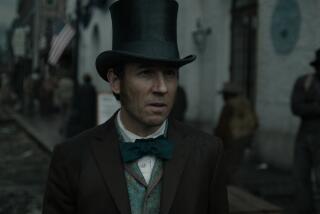President Lincoln, as his friends knew him
- Share via
“WE Are Lincoln Men” is a lovely visit with Abraham Lincoln through the eyes of the few real friends he had in life.
It is the thesis of David Herbert Donald, the dean of contemporary Lincoln scholars (he is now 83) and author of the definitive biography, “Lincoln,” that as president Lincoln had no one close to whom he could turn for advice and support as he struggled with burdens no president before or since has had to bear.
Donald leans on theories of modern psychology and on Aristotle. In psychological terms, he argues that since Lincoln had no intimate “chum” in childhood, he could not form the warmest sort of friends later in life. Maybe, but perhaps the nature of the human heart is too varied and too subtle to be categorized.
Aristotle, who invented the very idea of categories for human experience, is perhaps more helpful a guide. Donald cites the philosopher’s “Nicomachean Ethics,” in which he describes the three categories of friendship: “enjoyable,” in which friends simply take pleasure in one another’s company; “useful,” in which both parties have something to gain in associating with one another; and “perfect” or “complete” friendships, “in which there is free sharing of ideas, hopes, wishes, fears.”
Lincoln had some enjoyable friends, like the wild boys from the rural hamlet of Clary’s Grove with whom he raced and wrestled as a young man in New Salem, Ill. All his life he also had many useful friends; Donald quotes Lincoln’s law partner William H. Herndon as saying that in Lincoln’s early days “no man ever had an easier time of it.... He always had influential and financial friends to help him.”
But whether he had perfect or complete friendships is problematic. Donald focuses on six friends, all of whom left full reports of their association: Joshua F. Speed, to whom Lincoln was perhaps closest; Herndon; Illinois senator and fellow Republican Orville H. Browning; Lincoln’s secretary of state, William H. Seward; and presidential secretaries John Hay and John G. Nicolay.
Lincoln was 28 and Speed was five years younger when they met in Springfield, Ill., in 1837 as Lincoln was beginning the practice of law. He lived in a room above the store in which Speed had an interest, and he and Speed slept in the same bed for four years. They evidently talked about everything, and after Lincoln died, Speed said simply, “He disclosed his whole heart to me.”
Donald writes of speculation that the relationship was homoerotic; gay-rights activist and playwright Larry Kramer has claimed it was. Donald says there is no evidence, and he notes that at the time on the frontier many sorts of men -- from circuit judges to farmhands -- slept in the same bed because bedrooms, and beds, were scarce. None of Lincoln’s letters to Speed indicate such intimacy, Donald says, and he quotes specialists who say that Lincoln would have been a different man had he been gay.
Nonetheless, Speed was the closest friend Lincoln ever had, and though they drifted apart over the years, Donald shows that Speed still was helping Lincoln during the presidency.
After Lincoln’s death, Herndon, his law partner for 16 years, claimed -- and sometimes over-claimed -- an intimate knowledge of him. Yet even Herndon said, “He was the most reticent and mostly secretive man that ever existed: he never opened his whole soul to any man: he never touched the history or quality of his own nature in the presence of his friends.”
When Lincoln went to Washington, he and his wife, Mary, were friendly with Sen. Browning, but for political reasons that relationship ended. Lincoln’s friendship with Seward became warm and deep.
But it was the affectionate bond between Lincoln and his two young, hard-working secretaries -- the whole of his White House staff -- that brought warmth to the end of his lonely life.
Behind his back, they called him “the Ancient” and “the Tycoon.” He shared stories and laughter with them in the dark days of the Civil War. It was Hay (later an influential secretary of state under Presidents William McKinley and Theodore Roosevelt), while collaborating with Nicolay on a biography of their late chief, who wrote: “We are Lincoln men all the way through.”
Those sentiments were given fuller expression by another Lincoln man, Walt Whitman:
This dust was once the man,
Gentle, plain, just and resolute, under whose cautious hand,
Against the foulest crime in
history known in any land or age,
Was saved the Union of these States.










